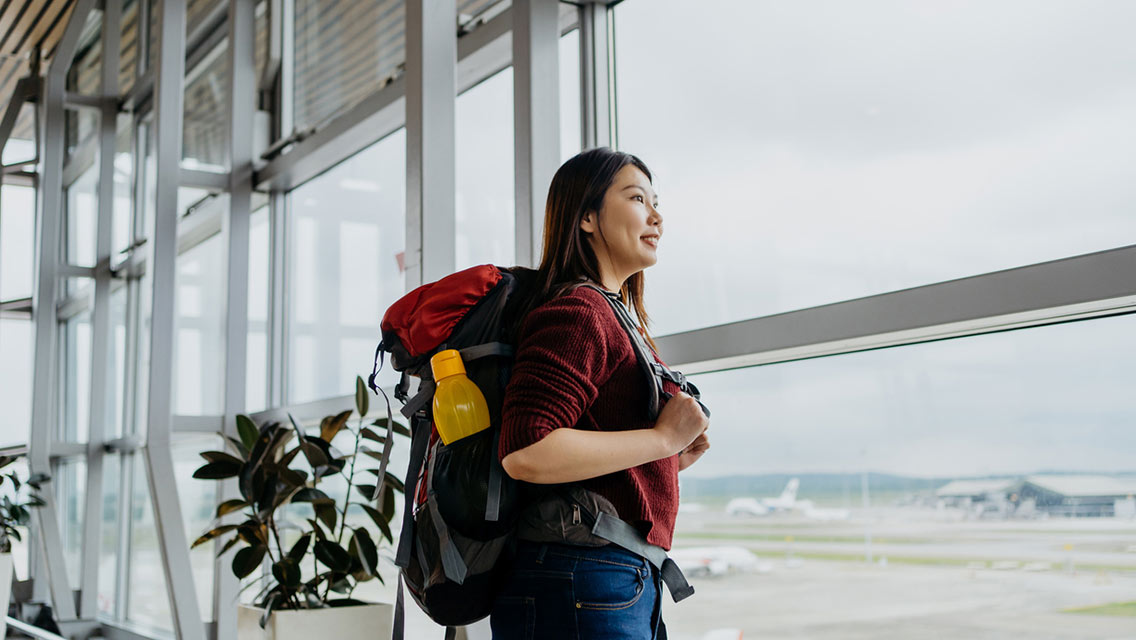Handy hints and tips on travelgear products for keeping you healthy when travelling How do you stay healthy when travelling?
We all know that often our health suffers when travelling.
From sea-sickness to dirty air conditioning to dodgy food, it is all about eliminating the risk as much as you can.
Jet Lag
Get your trip off to a great start by trying to beat Jet Lag. Our body suffers when we move quickly over multiple time zones.
Things to help beat jet lag: eat and drink lightly but often. We have found beginning to adjust to your destination time zone activities as soon as you can helps. Eg Sleep when it is night time in your destination. Expose your skin and eyes to natural light during the daytime when at your destination – remove those sunglasses! Of course, everyone is different.
Acupressure and homeopathic tablets to eliminate Jet Lag are remedies recommended by many people.
Ear Pain
Plenty of people suffer from ear pain with sudden changes of altitude. You can eliminate this with a pair of Earplanes which equalize the pressure slowly to avoid sudden changes and therefore ear pain.
Travel Sickness
Many people find the motion of travelling nauseating and exhausting.
Ginger is a natural remedy for motion sickness.
Another tip is to try to keep the horizon in view - it keeps your eye locked in to something steady to trick your mind.
When driving, reading is a common cause of travel sickness, as is not getting enough air flow. Keep your eyes up and the window down!
Travel acupressure wrist bands may help, as well as homeopathic tablets.
DVT
Every year, thousands of people are hospitalized with DVT – deep vein thrombosis. Simply, these are clots formed in your blood vessels. Why are the clots so dangerous? They can break off and lodge in smaller vessels in your lungs and brain, and cause a huge amount of damage – strokes, paralysis and death can result. One cause of the clots is inactivity – so people in confined spaces on planes, trains, buses and cars can all be susceptible if they do not make an effort to get that blood moving around and not forming clots. In a seated position, extra pressure is on our thighs, and also our knees being bent also can impede blood flow. Wriggle your toes, roll your ankles, raise your legs and get up for a stretch and walk as often as practical. Pressure socks can assist the veins in your lower legs push that blood around where it belongs – circulating!
Comfort
To arrive rested, you need to ensure you have a comfortable journey. This will be different for everyone. Some people require back support, some neck support, and some whole body support! We have a range of the best options in comfort pillows. If you are aiming to sleep in a seated position, we definitely recommend neck support at the least. Choose a pillow that is right for your body and travelling requirements. Some pillows deflate to pack down in a compact bag, whereas others comprise memory foam or regular foam for higher density and durability.
Check where your head falls when you sleep – do you need side neck support as well as head support? Do you need front support for your chin? Or does your head loll back? Do you need a pillow at your destination? Can you cope with weight or do you require a lightweight option? There are many options, and we can help with one that is right for you.
Germs Germs Germs
Clean Air
Despite all the facts about how clean air conditioner filters are, how they remove large pathogens and particles, why is it that many of us come down with the dreaded lurgy after a plane flight or bus trip? Partly it is to do with the people in our immediate vicinity – (hey who knows how clean they are?) and exposure to new pathogens that comes with being in crowded places for extended periods. How can you minimize the risk? Wearing a face mask seems a little over the top, and is not really effective once wet anyway. A personal filter on the vent closest to you at least removes some of the direct germs floating right for you. Nostril covers are also popular and maximise the clean air that you are breathing through your nose. When you arrive at your destination, try to air out your sleeping compartment as much as practicable before you sleep. Good luck!
Clean Food and Drink
Ok, so part of your travel experience is to eat something dodgy and laugh about it later. (But don’t forget about the pain and suffering in between!)
Trust boiled, bottled or sterilized water (yes this also means for cleaning your teeth!) and try not to eat any lukewarm food or anything obviously old.
Take a travel health kit, but be aware of the restrictions at your destination – some (first world) countries ban even innocent paracetemol! If in doubt, purchase something at your destination - most pharmacies will understand the hand signals for explosive diarrhoea!
Clean Hands
Take hand sanitizer where you can and use it frequently!
This even applies to your 5 star hotel room – other people are generally pigs and you can bet that even the best cleaning staff will miss the e-coli on the light switches. Use sanitiser or wash your hands for 10 seconds with soap - especially before you eat and after alighting from public transport. Try not to offend new friends by using sanitiser or wipes immediately after you shake hands – unless you are the germophobic detective Monk!
Sleep
Ahh sleep! The lovely restorative qualities of sleep are not to be underestimated in keeping yourself healthy.
Whether it is a business trip or a lovely holiday, most of us tend to push ourselves too hard to fit everything in.
Don’t forget to take time out to relax and make your sleep the best quality possible.
If you can, taking your own pillow ensures your sleep is comfortable to your standard, and not breathing in the mites from the last 100 guests. A sleeping sheet can provide you with the comfort you need, and there are also temperature regulating liners available that will help make your sleeping environment as comfortable as possible.
Wear an eyemask if you are sensitive to light and earplugs if noise bothers you. They really will make a difference to the quality of your sleep, and then you can dream about all the exciting things you have done!
Mosquito prevention
When travelling to malaria areas, it is particularly important to protect yourself against insect-borne diseases.
Use personal protection such as wristbands, headnets or skin repellent, as well as environmental protection such as mosquito nets and repellent discs or candles. Try to avoid getting bitten, but if you do, don’t panic. Seek medical attention if you begin to feel unwell.

